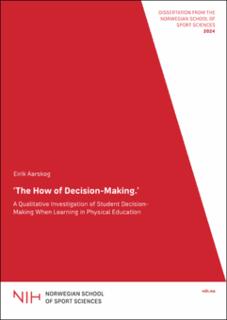| dc.description.abstract | The thematic focus of this article-based dissertation is student decision-making in connection to student learning in physical education (PE). Based on a review of previous Norwegian and international PE literature, the dissertation argues that complementary research on this topic seems beneficial. The review further indicates that it would be beneficial to investigate students’ decision-making processes by primarily focusing on students’ actions, thoughts, and interactions within the context of PE. The central idea is that while teachers’ thoughts and actions can provide valuable information about students, there is a lack of studies that specifically target students’ actions and thoughts within teacher-led PE. Furthermore, the dissertation emphasizes that research in PE related to students’ decisionmaking processes seldom connects claims about learning effects to explicit learning theoretical positions. With this background, the dissertation presents a progressively developing research project guided by the following four research questions:
(1) How can student decision-making be conceptualized with an explicit learning theoretical connection?
(2) How can student decision-making be investigated by focusing on student actions, reflections, and interactions?
(3) How do students participate in assessment processes occurring in Norwegian PE?
(4) How do students participate in curriculum negotiation in Norwegian PE?
In response to these research questions, Deweyan theory is applied to conceptualize decisionmaking. Within the developed framework, decision-making is conceptualized as an integral part of every learning process, where students “choose” how to solve indeterminate or problematic situations through behavioral processes that involve differing degrees of thought and reflection. The theoretical framework presented in the dissertation further outlines how these decision-making processes can be both individual and social and provide insights into the pedagogical potentials that different forms of decision-making may hold. The choice of this theoretical framework has several methodological implications that were significant when developing a methodology to investigate students' decision-making in PE. The methodology developed throughout the project is detailed in the dissertation, both in terms of its development process and its implementation in the physical education classes of two Norwegian junior high school classes.
The result of the methodological and subsequent analytical work is three individual published articles. The first published article is titled: What were you thinking? A methodological approach for exploring decision-making and learning in physical education. This article addresses the first two research questions by presenting a conceptualization of decisionmaking processes as part of individual learning and a methodology developed to investigate such decision-making in PE.
The second published article, "No assessment, no learning" exploring student participation in assessment in Norwegian physical education (PE), is mainly designed to address research question three. Still, it also exemplifies how the methodology can provide insights into students’ participation in assessment processes in physical education. The Article provides insight into how students from two Norwegian junior high school classes participate in the assessment processes that occur in PE. A central argument in the article is that, from the Dewey-inspired framework developed, all assessment is a form of decision-making, and students will always assess as they learn. From this perspective, the central question is not if students participate in assessment in physical education but how they do so. The article points out that although students participate in assessment in various ways, there seems to be pedagogical potential for teachers to guide students to use reflective processes to a greater extent than they do in the studied PE contexts.
The third article, "When it's something that you want to do." Exploring curriculum negotiation in Norwegian PE is mainly developed to address research question four. Still, this article also serves as an example of how the methodology can provide insights into students' participation in negotiation processes in physical education. The article shows that students appear to engage in numerous explicit and implicit negotiation processes in physical education. One of the main arguments in the article is that there seems to be pedagogical potential in making some of the implicit negotiations that occur in physical education explicit. The article further argues that there are negotiations that, for pedagogical reasons, should not be made explicit. According to the article, the ability to utilize the pedagogical potential inherent in various negotiation processes depends on reflective teachers making intelligent choices based on the knowledge of their own students.
In conclusion and contrary to much previous research, the dissertation, based on both the theoretical framework, methodological insights, and findings from the three articles, proposes that students seem to participate in a range of decision-making processes in PE. Thus, this dissertation contributes findings and arguments that provide insights into aspects of students' actions and thoughts previously underreported in the field. A key argument in the dissertation is that it is the conceptual framework developed and the methodological focus on students' actions, thoughts, and interactions that lead to this type of new insight. The main contribution of the dissertation is therefore argued to be the conceptual, methodological, and empirical insights developed that, in turn, provide new understandings of students' decision-making processes in PE. Further, by being connected to a specific learning theoretical perspective, the insights held provide ideas and thoughts for how teachers can act to harness the educational potential of the decision-making processes students constantly enter in the subject of PE. | en_US |
| dc.relation.haspart | Paper I: Aarskog, E., Barker, D., & Borgen, J. S. (2018). What were you thinking? A methodological approach for exploring decision-making and learning in physical education. Sport, Education and Society, 1-13. https://doi.org/10.1080/13573322.2018.1491836 | |
| dc.relation.haspart | Paper III: Aarskog, E., Barker, D., & Borgen, J. S. (2021). ‘When it’s something that you want to do.’ Exploring curriculum negotiation in Norwegian PE. Physical Education and Sport Pedagogy, 1-14. https://doi.org/10.1080/17408989.2021.1934660 | |
